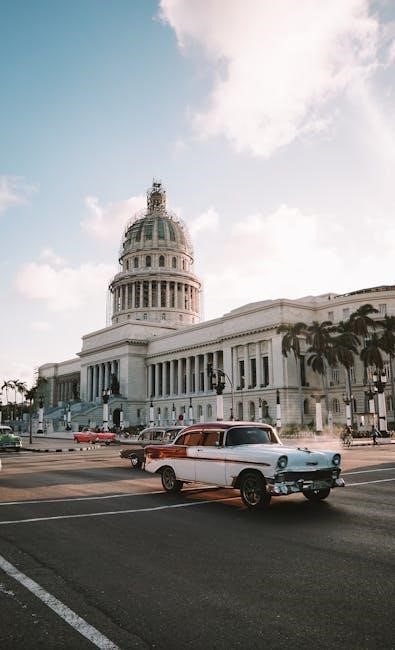Understanding Cuba’s customs regulations is essential for facilitating legal trade and compliance with national laws. These norms govern the import and export of goods‚ ensuring adherence to legal frameworks. They are crucial for individuals and businesses aiming to navigate Cuba’s market effectively and avoid penalties.
Overview of the Importance of Understanding Customs Norms
Understanding Cuban customs norms is vital for ensuring compliance with legal obligations and facilitating smooth trade operations. These regulations govern the flow of goods‚ services‚ and individuals‚ impacting both businesses and travelers. Proper knowledge of customs norms helps avoid penalties‚ delays‚ and legal complications. It also ensures adherence to national security and economic policies. For businesses‚ compliance with customs regulations is crucial for maintaining operational efficiency and building trust with authorities. Staying informed about updates to these norms is essential for navigating Cuba’s evolving trade landscape effectively and avoiding potential risks associated with non-compliance.
Key Objectives of the 2024 Customs Regulations
The 2024 Cuban customs regulations aim to modernize and streamline trade processes‚ ensuring compliance with international standards. Key objectives include simplifying import/export procedures‚ enhancing transparency‚ and reducing bureaucratic hurdles. These norms also seek to strengthen legal frameworks to prevent smuggling and fraud. Additionally‚ they focus on updating taxation systems to align with economic reforms. By clarifying documentation requirements‚ the regulations aim to facilitate efficient customs clearance for both individuals and businesses. Overall‚ the 2024 norms strive to promote legal trade‚ protect national interests‚ and adapt to global trade dynamics while ensuring a fair and regulated market environment.

Regulatory Framework
Cuba’s customs regulations are governed by a comprehensive legal framework that ensures compliance with national laws and international trade standards‚ enforced by the Aduana General de la República.
General Overview of Cuban Customs Laws
Cuban customs laws are designed to regulate the movement of goods across borders‚ ensuring compliance with national security‚ economic‚ and public health interests. These laws outline procedures for imports‚ exports‚ and transit of goods‚ as well as the payment of duties and taxes. The Aduana General de la República is responsible for enforcing these regulations‚ which aim to facilitate legal trade while preventing smuggling and fraud. The laws also establish clear guidelines for prohibited and restricted items‚ ensuring adherence to international agreements and domestic legal frameworks. Compliance with these norms is essential for individuals and businesses engaging in trade activities in Cuba.
Legal Basis for Customs Regulations in Cuba
The legal framework for Cuban customs regulations is established through a series of laws and decrees aimed at governing international trade and border control. Key legislation includes Law No. 131 of 2020‚ which outlines customs procedures‚ and Decree No. 344‚ detailing tax and duty payment systems. These laws ensure compliance with national and international trade agreements‚ while also addressing public safety and economic interests. The legal basis emphasizes transparency‚ fairness‚ and the prevention of illicit activities‚ providing a structured approach to customs operations in Cuba.
Role of the Aduana General de la República in Implementing Norms
The Aduana General de la República plays a pivotal role in enforcing Cuban customs regulations. As the central authority‚ it oversees all customs operations‚ ensuring compliance with legal standards. It verifies the accuracy of declarations‚ collects duties‚ and prevents smuggling. The agency also regulates restricted items‚ monitors trade activities‚ and provides guidance to importers and exporters. By maintaining the integrity of customs processes‚ the Aduana General supports Cuba’s economic stability and security. Its efforts are crucial for facilitating legal trade while safeguarding national interests and preventing illegal activities.

Key Changes in Normas Aduaneras de Cuba 2024
The 2024 updates include streamlined import/export procedures‚ enhanced documentation requirements‚ and revised lists of prohibited items. These changes aim to modernize trade processes and improve compliance efficiency.
New Regulations on Import and Export Procedures
The 2024 Cuban customs regulations introduced streamlined import and export procedures‚ focusing on reducing bureaucratic hurdles. Key updates include digital submission of documents‚ clearer timelines for approvals‚ and simplified classification of goods; These changes aim to enhance transparency and efficiency‚ facilitating smoother trade operations for both individuals and businesses. Additionally‚ the new norms emphasize compliance with international standards‚ ensuring that Cuba aligns with global trade practices. This modernization is expected to boost trade volumes and attract foreign investment‚ while maintaining stringent controls to prevent illegal activities. The updated procedures also include stricter penalties for non-compliance‚ ensuring adherence to the new regulations.
Updates to Taxation and Tariff Systems
The 2024 Cuban customs regulations include significant updates to taxation and tariff systems‚ aiming to modernize and clarify fiscal policies. New tax rates have been introduced for specific categories of goods‚ with exemptions for certain essential items to reduce financial burdens. The revised tariff structure aligns with international trade standards‚ promoting fair competition and transparency. Additionally‚ digital platforms now facilitate tax calculations and payments‚ streamlining compliance for importers and exporters. These updates reflect Cuba’s efforts to create a more efficient and equitable trade environment‚ encouraging legal trade while generating revenue for public services and economic development.
Revisions to Prohibited and Restricted Items List
The 2024 Cuban customs regulations have revised the list of prohibited and restricted items to align with national security‚ public health‚ and economic objectives. Certain electronics‚ chemicals‚ and dual-use goods now face stricter controls‚ requiring special permits. Additionally‚ some agricultural products have been added to the restricted list to protect local production. These revisions aim to safeguard Cuba’s strategic interests while ensuring compliance with international trade agreements. Importers and exporters must carefully review these updates to avoid delays or penalties‚ as non-compliance can result in confiscated goods or legal action.
Enhanced Documentation Requirements
The 2024 Cuban customs regulations emphasize stricter documentation requirements to ensure compliance and transparency. Importers and exporters must now provide detailed commercial invoices‚ certificates of origin‚ and health certificates for certain goods. Additionally‚ digital submission of documents through Cuba’s customs platform is mandatory‚ streamlining the process but requiring accurate and timely uploads. Failure to meet these requirements can lead to delays‚ fines‚ or confiscation of goods. Proper documentation ensures smooth customs clearance and avoids legal complications‚ making it essential for all parties involved in international trade with Cuba.

Import and Export Procedures
Cuba’s 2024 customs regulations outline detailed procedures for importing and exporting goods‚ ensuring compliance with legal frameworks. Proper documentation and adherence to norms are essential for smooth transactions.
Step-by-Step Guide to Importing Goods into Cuba
- Understand Cuba’s customs regulations and identify prohibited or restricted items.
- Prepare necessary documentation: commercial invoice‚ bill of lading‚ and packing list.
- Submit the import declaration to the Aduana General de la República within the required timeframe.
- Ensure goods comply with Cuban standards and labeling requirements.
- Pay applicable duties‚ taxes‚ and fees as calculated by customs authorities.
- Arrange for customs inspection and clearance at the designated port of entry.
- Obtain final clearance and proceed with the delivery of goods.
Compliance with these steps is crucial to avoid delays or penalties.
Export Regulations and Requirements
Exporting goods from Cuba requires adherence to specific regulations and obtaining necessary permits. Exporters must submit detailed documentation‚ including export declarations and commercial invoices‚ to the Aduana General de la República. Compliance with Cuban export laws and international trade agreements is mandatory. Certain goods‚ such as cultural artifacts and sensitive materials‚ are subject to strict restrictions. Customs authorities conduct inspections to ensure goods meet legal standards. Proper packaging‚ labeling‚ and compliance with sanitary and phytosanitary measures are also required. Failure to meet these requirements can result in delays or penalties. Consulting customs brokers can facilitate the process and ensure adherence to norms.
Customs Clearance Process for Individuals and Businesses
Customs clearance in Cuba involves a structured process for both individuals and businesses. Individuals must declare personal effects and goods‚ adhering to duty-free allowances. Businesses require commercial invoices‚ export permits‚ and compliance with tariff codes. All goods must be presented for inspection‚ and accurate documentation is essential. The Aduana General de la República oversees the process‚ ensuring adherence to regulations. Digital systems now facilitate faster submissions and payments. Proper compliance avoids fines and delays. Understanding the process is vital for smooth operations‚ whether for personal or commercial purposes. Correct documentation and timely submissions are key to efficient customs clearance.
Restrictions and Prohibitions
Cuba’s customs regulations outline specific restrictions on prohibited and restricted items‚ including weapons‚ narcotics‚ and certain technologies. Legal consequences apply for violations‚ ensuring national security and regulatory compliance.
Prohibited Items Under Cuban Customs Law
Cuban customs law prohibits the importation of weapons‚ narcotics‚ and certain advanced technologies without special authorization. These restrictions aim to protect national security‚ public health‚ and cultural heritage. Additionally‚ items deemed subversive or contrary to socialist values are banned. The regulations strictly enforce these prohibitions to prevent illegal activities and maintain social order. Violations result in severe penalties‚ including confiscation and legal prosecution. Understanding these restrictions is crucial for compliance and avoiding legal consequences when engaging in international trade or personal imports in Cuba.
Restricted Goods and Special Permits
Certain goods‚ such as high-tech equipment‚ chemicals‚ and agricultural products‚ are subject to strict regulations and require special permits. These restrictions aim to protect national security‚ public safety‚ and environmental integrity. Importers must obtain authorization from relevant authorities‚ providing detailed documentation. The process ensures compliance with Cuba’s strategic interests and international agreements. Non-compliance may result in fines or confiscation. Understanding these requirements is vital for legal importation and avoiding penalties. Restricted goods are carefully monitored to balance economic activity with societal and environmental protection‚ reflecting Cuba’s commitment to controlled and sustainable trade practices.
Exemptions and Special Cases
Certain exemptions apply to diplomatic missions‚ humanitarian aid‚ and specific goods‚ ensuring compliance with international agreements while addressing unique circumstances.
Diplomatic and Consular Exemptions
Diplomatic and consular missions‚ along with their officials‚ are granted specific exemptions under Cuban customs regulations. These exemptions‚ outlined in international agreements‚ ensure the smooth operation of diplomatic activities. They often include duty-free imports of goods for official use‚ simplified customs procedures‚ and immunity from certain inspections. Such provisions align with global diplomatic protocols‚ fostering international cooperation and respect for sovereign immunity. These exemptions are crucial for maintaining the integrity of diplomatic relations and facilitating the work of foreign representatives in Cuba.
Exemptions for Humanitarian Aid and Donations
Humanitarian aid and donations destined for charitable purposes are typically exempt from certain customs duties and taxes in Cuba. These exemptions aim to support vulnerable populations and address social needs. Eligible items‚ such as food‚ medicine‚ and clothing‚ must meet specific criteria and be approved by relevant authorities. Proper documentation‚ including proof of donation and intended use‚ is required to qualify for these exemptions. Such provisions reflect Cuba’s commitment to facilitating aid while ensuring compliance with customs regulations. These measures help streamline the delivery of essential goods to those in need.

Penalties and Consequences
Violations of Cuban customs regulations may result in fines‚ confiscation of goods‚ or legal action. Severe cases‚ such as smuggling‚ can lead to criminal charges and penalties.
Penalties for Non-Compliance with Customs Regulations
Non-compliance with Cuban customs regulations can result in severe penalties‚ including fines‚ confiscation of goods‚ and legal action. Individuals or businesses found violating norms may face financial penalties proportional to the severity of the offense. Smuggling or fraudulent activities can lead to criminal charges‚ imprisonment‚ and hefty fines. Repeat offenses may result in heightened penalties or even bans on future trade activities. Authorities prioritize enforcement to ensure adherence to legal frameworks‚ protecting national interests and maintaining fair trade practices. It is crucial for individuals and businesses to fully understand and comply with all regulations to avoid such consequences.
Consequences of Smuggling and Fraudulent Activities
Smuggling and fraudulent activities under Cuba’s customs regulations lead to severe legal consequences. Offenders face criminal charges‚ hefty fines‚ and confiscation of goods. In severe cases‚ imprisonment is imposed‚ particularly for organized smuggling rings. Fraudulent practices‚ such as undervaluing goods or misdeclaring items‚ result in financial penalties and potential bans on future trade. Authorities rigorously enforce these measures to combat illegal activities and protect national security. Engaging in such practices not only jeopardizes businesses but also undermines the integrity of Cuba’s customs system‚ leading to prolonged legal battles and reputational damage. Compliance is essential to avoid these detrimental outcomes.
Special Considerations
Cuba’s customs regulations include special provisions for diplomatic missions‚ temporary imports‚ and specific goods requiring exceptional handling. These norms ensure compliance while addressing unique circumstances and international agreements.
Customs Regulations for Diplomatic Missions
Diplomatic missions in Cuba are granted specific customs privileges under international law‚ ensuring smooth operations for diplomatic personnel. These regulations often include tax exemptions‚ duty-free imports for official use‚ and streamlined procedures for diplomatic cargo. Diplomatic bags and personnel must still comply with certain documentation requirements‚ such as presenting diplomatic passports or official letters. While these missions enjoy privileged status‚ they must adhere to Cuban customs laws to avoid discrepancies. The norms aim to balance diplomatic immunity with national security and economic interests‚ ensuring transparency and cooperation. Proper compliance is essential to maintain these exemptions and facilitate uninterrupted diplomatic activities.
Norms for Temporary Imports and Exports
Temporary imports and exports in Cuba are regulated to facilitate trade while ensuring compliance with customs laws. These norms allow goods to enter or leave the country for specific periods‚ often for processing‚ exhibitions‚ or repairs‚ without paying full duties. The 2024 regulations outline clear timelines and documentation requirements to avoid misuse. Proper authorization and detailed inventory lists are mandatory to ensure goods are re-exported or returned; These provisions aim to balance trade facilitation with national security‚ preventing unauthorized sales. Compliance is crucial to avoid penalties and ensure smooth operations for businesses and individuals engaged in temporary trade activities under Cuban customs law.
Compliance and Requirements
Compliance with Cuban customs regulations is mandatory for all imports and exports. Accurate documentation‚ proper declarations‚ and adherence to legal standards ensure smooth customs processes and avoid penalties.
Documentation Required for Customs Clearance
Proper documentation is critical for customs clearance in Cuba. Required documents include commercial invoices‚ bills of lading‚ certificates of origin‚ and import/export licenses. All paperwork must be accurate and detailed to ensure compliance with regulations. Additionally‚ digital systems now facilitate online declarations‚ streamlining the process. Ensuring all documents align with current norms minimizes delays and penalties. Businesses and individuals must verify the authenticity and completeness of their paperwork before submission. This step is vital for avoiding issues during customs reviews.
Role of Customs Brokers in Ensuring Compliance
Customs brokers play a pivotal role in ensuring compliance with Cuban customs regulations. They act as intermediaries‚ assisting individuals and businesses in navigating complex procedures. Brokers prepare and submit necessary documentation‚ calculate duties‚ and ensure adherence to legal requirements. Their expertise minimizes the risk of errors‚ delays‚ or penalties. With in-depth knowledge of regulations‚ they streamline the clearance process‚ ensuring all imports and exports align with current norms. Their services are invaluable for those unfamiliar with Cuba’s specific customs requirements‚ making them essential partners in maintaining legal and operational efficiency.

Digital Systems and Modernization
Cuba’s customs regulations now emphasize digital systems to modernize procedures. Online platforms facilitate declarations and duty payments‚ enhancing efficiency and transparency in trade processes.
Implementation of Digital Customs Systems in Cuba
The 2024 Cuban customs regulations emphasize the adoption of digital systems to streamline processes. Online platforms now enable electronic declarations‚ reducing paperwork and delays. Digital documentation‚ such as electronic invoices and customs forms‚ is mandated to enhance transparency and efficiency. These modernization efforts aim to align Cuba’s customs procedures with global standards‚ facilitating smoother international trade. The implementation of these systems is expected to reduce bureaucratic hurdles‚ improve compliance‚ and increase the accuracy of customs declarations. This digital transformation marks a significant step forward in Cuba’s efforts to integrate into the global economy while maintaining regulatory oversight.
Online Declaration and Payment of Duties
The 2024 Cuban customs regulations introduce an online platform for declaring and paying duties‚ enhancing efficiency and transparency. This system allows individuals and businesses to submit customs declarations electronically‚ reducing processing times. Digital payment options simplify the duty payment process‚ ensuring compliance and reducing delays. The online system is integrated with the digital customs framework‚ providing real-time updates and minimizing errors. This innovation facilitates smoother trade operations while maintaining regulatory compliance‚ aligning Cuba’s customs procedures with modern standards. The online declaration and payment system is a key component of Cuba’s customs modernization efforts‚ aimed at improving trade facilitation and reducing bureaucratic hurdles.
Impact on Businesses and Individuals
The 2024 Cuban customs regulations significantly affect businesses and individuals by streamlining trade processes‚ reducing delays‚ and ensuring compliance with updated legal frameworks and documentation requirements.
Effects of 2024 Regulations on International Trade
The 2024 Cuban customs regulations have introduced significant changes impacting international trade. These updates aim to enhance efficiency and compliance‚ streamlining import/export processes. Businesses must adapt to new documentation requirements and updated tariff systems‚ which may increase administrative burdens but also ensure clearer trade rules. The revised list of prohibited and restricted items further influences trade dynamics‚ requiring exporters to carefully review their products. Additionally‚ the regulations promote transparency and reduce illegal activities‚ fostering a more stable trade environment. These changes are expected to strengthen Cuba’s integration into global markets while ensuring adherence to international trade standards and practices.
Guidelines for Businesses to Adapt to New Norms
Businesses must proactively adapt to Cuba’s 2024 customs regulations to ensure compliance and maintain smooth trade operations. Understanding updated documentation requirements and revised tariffs is critical. Engaging customs brokers can simplify processes and reduce delays. Staying informed about prohibited and restricted items is essential to avoid penalties. Leveraging digital customs systems for declarations and payments can enhance efficiency. Regularly reviewing and updating compliance strategies will help businesses align with the new norms. Training staff on these changes is vital to minimize errors and ensure adherence to legal standards‚ fostering long-term success in Cuba’s evolving trade environment.

Future Outlook
Cuba’s customs regulations are expected to evolve‚ focusing on digital transformation and harmonization with international trade standards. Future reforms may streamline processes‚ enhancing efficiency and fostering global trade partnerships.
Expected Changes and Reforms in Cuban Customs Law
Future reforms in Cuban customs law aim to modernize procedures‚ aligning with global trade standards. Digital transformation and streamlined documentation processes are anticipated to improve efficiency. Efforts to harmonize regulations with international norms may reduce bureaucratic hurdles‚ fostering easier trade. Updates to restricted items lists and clearer guidelines for compliance are expected to enhance transparency. Additionally‚ reforms may address penalties for non-compliance‚ ensuring fair enforcement. These changes reflect Cuba’s commitment to integrating into the global economy while maintaining sovereignty over its trade policies.
Impact of Global Trade Trends on Cuban Regulations
Global trade trends significantly influence Cuba’s customs regulations‚ prompting adaptations to remain competitive. Increasing participation in international agreements and organizations like the WTO drives updates to align with global standards. The rise of digital systems and sustainable trade practices also shapes Cuba’s regulatory framework. The EU’s approach to energy relations and trade modernization serves as a reference. These trends encourage Cuba to streamline procedures‚ enhance transparency‚ and integrate into the global economy while preserving its sovereignty. Staying attuned to international developments ensures Cuba’s customs regulations remain relevant and effective in a rapidly changing trade landscape.
The 2024 Cuban customs regulations aim to modernize and streamline trade processes‚ ensuring compliance and alignment with global standards while addressing specific national needs and challenges.
The 2024 Cuban customs regulations introduce significant updates to import/export procedures‚ taxation‚ and documentation requirements. Key changes include enhanced digital systems‚ revised lists of prohibited/restricted items‚ and stricter compliance measures. The regulations aim to modernize trade processes‚ ensure legal adherence‚ and align with global standards while addressing Cuba’s unique economic and political context. These norms emphasize the importance of accurate documentation and the role of customs brokers in facilitating compliance. Overall‚ the 2024 updates streamline trade operations while maintaining national security and economic integrity.
- Digital customs systems for efficient processing.
- Revised prohibited and restricted goods list.
- Enhanced documentation and compliance requirements.
Final Thoughts on Compliance and Future Prospects
Compliance with Cuba’s 2024 customs regulations is crucial for avoiding penalties and ensuring smooth trade operations. Businesses and individuals must stay informed about updates and adapt to new requirements. Future prospects suggest a continued focus on digitalization and streamlined processes‚ enhancing efficiency and transparency. Proactive engagement with customs authorities and brokers will be key to navigating the evolving regulatory landscape. By adhering to these norms‚ stakeholders can contribute to Cuba’s economic growth while maintaining legal and operational integrity.
- Compliance ensures smooth trade operations.
- Future regulations may further prioritize digital systems.
- Proactive adaptation is essential for success.



